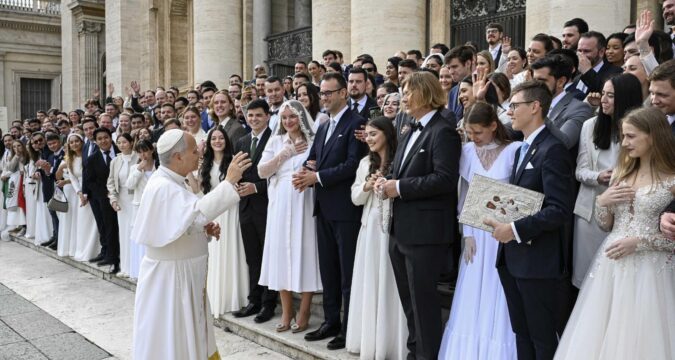
VATICAN (CNS): The foundation of sacramental marriage is the unity of the spouses, a bond so intense and grace-filled that it is exclusive and indissoluble, said a document from the Dicastery for the Doctrine of the Faith.
The document, Una Caro [One Flesh]: In Praise of Monogamy. Doctrinal Note on the Value of Marriage as an Exclusive Union and Mutual Belonging, was released in Italian by the Vatican on November 25. Pope Leo XIV approved it on November 21.
“Although each marital union is a unique reality, embodied within human limitations, every authentic marriage is a unity composed of two individuals, requiring a relationship so intimate and all-encompassing that it cannot be shared with others,” the document said.
Víctor Manuel Cardinal Fernández, prefect of the dicastery, wrote that the it drew from scripture, theology, philosophy, and “even poetry” to show why “a unique and exclusive union of love, a reciprocal belonging that is rich and all-embracing,” is best.
Poets quoted in the document include Walt Whitman, Pablo Neruda, Emily Dickinson, and Rabindranath Tagore.
The note responds to requests from African bishops, where polygamy persists, and addresses the rise of non-monogamous unions, or “polyamory,” in the West.
“Polygamy, adultery or polyamory are based on the illusion that the intensity of a relationship can be found in the succession of faces,” the document said. But “as the myth of Don Juan illustrates, numbers dissolve the names; they disperse the unity of the loving impulse.”
The note observes that while much has been written on the indissolubility of marriage, less attention has been given to its unity—understood as a unique, exclusive union between one man and one woman.
The dicastery reaffirmed that sacramental marriage is permanent and open to procreation, but said the note’s main focus is the unitive aspect of marriage.
Although polygamy appears in the Old Testament, many passages celebrate exclusive, monogamous love. The Song of Songs, for example, uses the language of lovers to allegorically describe God’s unique and exclusive relationship with his people.
The gospels present Jesus affirming faithful, lifelong monogamy, referencing God’s “original plan” for a man and a woman to become “one flesh.”
The document examines teachings from popes and Christian theologians, from the early Church to modern times, on marriage.
St. John Chrysostom, unlike many early theologians, emphasised that “the unity of marriage, through the choice of a single person to whom one is joined, serves to free people from an unrestrained sexual outlet devoid of love or fidelity, and properly directs sexuality,” rather than focusing on procreation.
Prior to Pope Leo XIII’s 1880 encyclical on marriage, Arcanum Divinae, popes wrote little on the topic, the document notes.
The encyclical argued that defending monogamy is also dignity of women, which cannot be denied or dishonored even for the sake of procreation. The unity of marriage therefore implies a free choice on the part of the woman, who has the right to demand exclusive reciprocity.”
Marriage, as a union between a man and a woman “who possess exactly the same dignity and the same rights,” demands exclusivity so that neither is reduced to a means for satisfying needs, the document states.
In the Latin-rite sacrament, consent—expressed as “I take you as my wife” and “I take you as my husband”—is, following Vatican II, a “human act by which the spouses mutually give and receive one another.”
The doctrinal note said, “This act, ‘which binds the spouses to each other,’ is a giving and a receiving: it is the dynamism that gives rise to mutual belonging, called to deepen, to mature and to become ever more solid.”
Exclusive belonging may change in its expression as physical attraction or sexual relations diminish, but it does not end, the document explains.
“Various intimate expressions of affection—also exclusive—naturally remain present. As reciprocal belonging deepens, certain expressions become reserved exclusively for the one with whom a unique bond is shared,” the document states.
“Exclusive, reciprocal love brings a delicate care and respect for the freedom and dignity of the other,” the note observes.
The unique friendship of spouses is “full of mutual knowledge, appreciation, intimacy, understanding, patience, concern for the other’s good, and sensitive gestures,” the document notes.
That friendship “transcends sexuality,” yet also “embraces it, giving it its most beautiful, profound, unifying, and fruitful meaning,” the document concludes.








